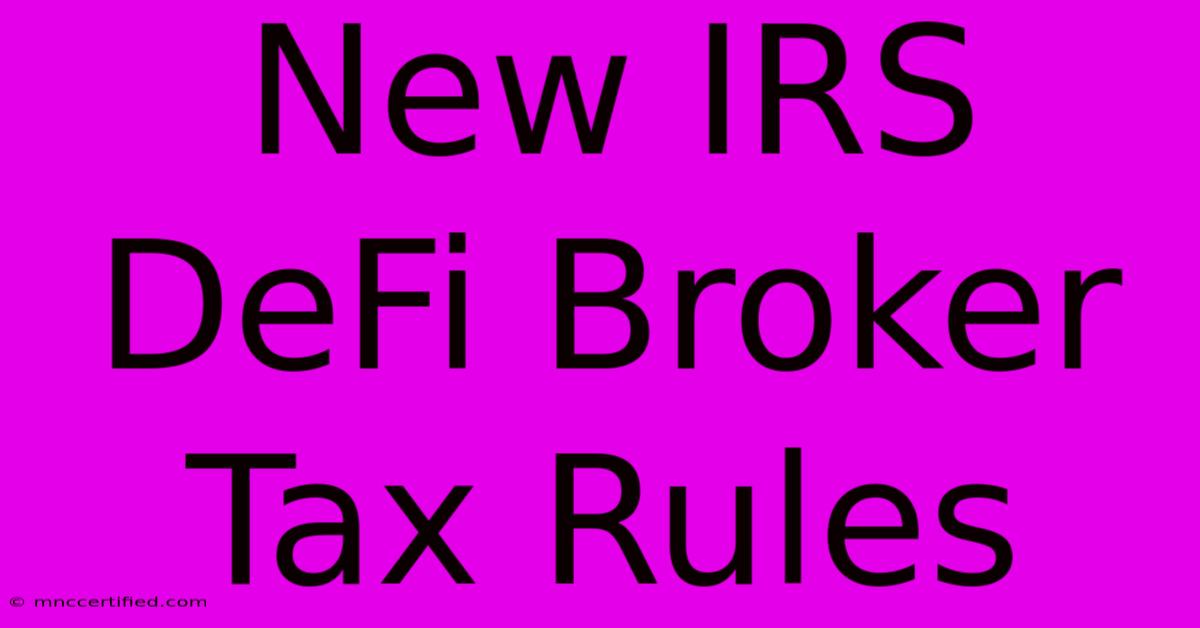New IRS DeFi Broker Tax Rules

Table of Contents
New IRS DeFi Broker Tax Rules: What You Need to Know
The world of Decentralized Finance (DeFi) is rapidly evolving, and with it, the tax implications. The Internal Revenue Service (IRS) is increasingly focusing its attention on DeFi activities, and recent announcements have significantly impacted how taxpayers report their DeFi transactions. Understanding these new IRS DeFi broker tax rules is crucial for anyone involved in DeFi to avoid potential penalties. This article breaks down the key changes and what you need to do to stay compliant.
What Constitutes a DeFi Broker Under the New Rules?
The IRS's definition of a "broker" in the context of DeFi is broad and potentially encompasses a wider range of entities than traditional financial institutions. The key is whether the platform facilitates transactions and reports information to the IRS about users' activities. This can include, but isn't limited to:
- Decentralized Exchanges (DEXs): Even though DEXs are designed to be decentralized, if they maintain records of user transactions, they may be considered brokers under the new rules. This is a significant shift, as many previously believed DEX transactions were beyond the IRS's reach.
- Lending and Borrowing Platforms: Platforms facilitating lending and borrowing of cryptocurrencies, like Aave or Compound, could fall under the broker definition if they report user activity.
- Yield Farming Platforms: Platforms offering yield farming opportunities may also be classified as brokers depending on the level of information they maintain about users' activities.
The ambiguity surrounding the definition leaves room for interpretation and potential disputes. However, the IRS is clearly signaling its intent to broaden its tax collection reach within the DeFi ecosystem.
How the New Rules Affect Your Tax Reporting
The new rules significantly impact how you report your DeFi income. Previously, the responsibility for reporting DeFi transactions often fell solely on the individual taxpayer. Now, brokers are required to issue Form 1099-B, reporting proceeds from cryptocurrency sales or exchanges. This means that if you used a platform classified as a broker, you'll receive a 1099-B detailing your transactions. This information needs to be carefully reviewed and accurately reflected in your tax return.
Discrepancies between your records and the 1099-B can lead to significant penalties, so maintaining meticulous records of all your DeFi transactions is paramount. This includes:
- Date of transaction: Precisely record the date of each transaction.
- Type of transaction: Clearly identify the type of activity (e.g., swap, yield farming, lending).
- Amount of cryptocurrency: Specify the exact amount of cryptocurrency involved in each transaction.
- Basis of cryptocurrency: Accurately determine the cost basis of your cryptocurrency to calculate capital gains or losses.
Navigating the Complexity: Key Considerations
The implications of these new rules are far-reaching and require careful consideration. Here are some key points to remember:
- Record Keeping: Implement a robust system for tracking all DeFi transactions. Spreadsheet software or dedicated cryptocurrency accounting tools can be invaluable.
- Tax Professional: Consult with a qualified tax professional experienced in cryptocurrency taxation. The complexities of DeFi transactions necessitate expert guidance to ensure compliance.
- Stay Updated: The DeFi landscape and its associated tax regulations are constantly evolving. Stay informed about the latest developments and updates from the IRS.
- Potential Audits: Be prepared for the possibility of an IRS audit. Maintain thorough documentation to support your tax filings.
Conclusion: Preparing for the Future of DeFi Taxation
The new IRS DeFi broker tax rules represent a significant shift in how the government is approaching the taxation of decentralized finance. Understanding these rules and proactively managing your DeFi tax obligations is crucial for avoiding penalties and ensuring compliance. By diligently maintaining accurate records and seeking professional guidance, you can navigate the complexities of DeFi taxation and maintain a strong financial standing. The future of DeFi taxation is still developing, so continued vigilance and adaptation are necessary for navigating this evolving landscape.

Thank you for visiting our website wich cover about New IRS DeFi Broker Tax Rules. We hope the information provided has been useful to you. Feel free to contact us if you have any questions or need further assistance. See you next time and dont miss to bookmark.
Featured Posts
-
Fans React Beyond Paradise Character Back
Dec 28, 2024
-
Syracuse Football Holiday Bowl Game Thread
Dec 28, 2024
-
Michigan Pet Food Contaminated Recall
Dec 28, 2024
-
Arkansas Wins Liberty Bowl Over Texas Tech
Dec 28, 2024
-
Live Arsenal Vs Ipswich Kais Performance
Dec 28, 2024